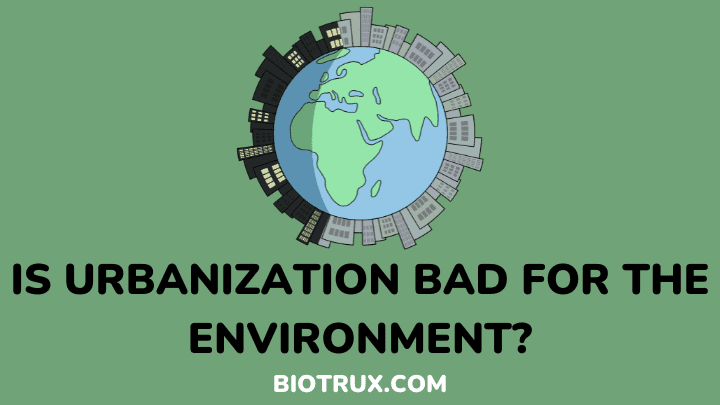It’s incredible how urbanization has changed how we live. We’ve built bustling cities and towering skyscrapers, but at what cost to our environment?
As humans flock to cities, resources like water and energy become stretched thin; natural habitats are lost as green spaces are replaced with concrete structures.
Pollution levels soar, and fresh air becomes hard to come by. Urbanization can bring many benefits, but it also affects our environment in various ways.
This article highlights the positive and negative impacts of urbanization on the environment.
What is Urbanization?
Urbanization is people and businesses moving from rural to urban areas, creating cities and other densely populated areas. It’s a natural part of human evolution that we see happening worldwide today.
As cities become more populated, public transportation, healthcare, education, cultural activities, and entertainment become more easily accessible.
This makes it easier for people of different backgrounds to come together and live harmoniously. Urbanization is an exciting time of growth and opportunity.
The Positive Impacts of Urbanization on the Environment
1. Urbanization reduces poverty
Urbanization brings countless benefits to our environment, including poverty reduction. In cities, the population is often more concentrated, which increases the opportunities for citizens to find work and improve their quality of life.
Infrastructure like public transportation, education systems, and health care are usually much better in urban areas than in rural ones, making it easier for people to break out of poverty.
Large cities also bring more economic growth and stability, creating numerous jobs and stimulating local economies.
2. Increased social and cultural exchanges
Living in cities also has positive effects on the environment. As more people move to urban areas, they’re exposed to different cultures, ideas, and experiences.
This encourages learning and a greater understanding of other cultures and nationalities and promotes healthier relationships between people of different backgrounds.
By creating a more cohesive community, we can reduce friction and create an environment that is more open to accepting new ideas and perspectives. This can result in greater environmental awareness among citizens and increase sustainability initiatives.
3. Innovation of technology
Although urbanization hurts the environment, it can be a highly positive force for technological innovation. Technology has played an invaluable role in helping reduce pollution and energy consumption, improving the sustainability of urban environments.
With advancements in renewable energy sources, efficient transportation systems, and waste management solutions, urban areas have become more eco-friendly than ever before.
By utilizing new technologies, cities can create a better standard of living for their inhabitants while minimizing their environmental impacts simultaneously.
4. Better economic productivity
Urbanization has brought many benefits to our environment, one of the most important being increased economic productivity. Having access to resources and working together more efficiently in a city makes businesses more successful, and job prospects more promising.
Not only is this great for our wallets, but it’s also a step toward sustainability. With more efficient production and fewer resources being used, we can help preserve our planet while also seeing socioeconomic gains.
5. More access to recycling programs
Urbanization has positively impacted the environment through its access to recycling programs. Recycling centers are popping up all over, giving us places to take our cans, bottles, paper, and cardboard to be turned into something new or reused wherever possible.
Recycling helps to reduce our carbon footprint, keeps our waterways clean, and makes environmentally friendly practices more accessible for everyone.
Urbanization has greatly impacted access to these practices, making it possible for everyone to make small changes for a healthier future.
The Negative Impacts of Urbanization on the Environment
1. Destruction of natural habitats
Urbanization can have some major negative impacts on the environment – not the least of which is the destruction of natural habitats.
As cities and urban centers grow, they encroach upon or replace once-thriving ecosystems, leaving species of plants and animals without a home.
This destruction also has a ripple effect; destroying nature deprives other species of food and shelter, exposing them to predators and vulnerability.
2. Overcrowding
Urbanization often has numerous environmental impacts that can harm our physical and mental well-being. One impact of urbanization is overcrowding, which means more people live in limited spaces.
The strain on infrastructure from overcrowding can lead to availability issues with basic resources such as clean air, water, and shelter. This can cause long-term health consequences such as respiratory diseases and mental health issues such as anxiety.
Furthermore, overcrowded cities also risk crime, pollution, noise, and higher stress levels.
3. Invasive species
Urbanization is increasing at an alarming rate worldwide, and with it comes various environmental challenges. One of these issues is the introduction of invasive species into new habitats.
Invasive species are non-native plants, animals, and microorganisms that can cause harm to natural ecosystems. They compete for resources with native species, crowding out native vegetation, spreading disease, and destroying habitats.
Invasive species can also alter the chemical makeup of the habitat, leading to further ecosystem disruption. The negative effects of invasive species are far-reaching and have long-term impacts on biodiversity and natural resource management.
4. Pollution of air and waterways
We all want cities to be more livable, but sometimes the way urban areas grow comes at a cost. Pollution of air and waterways are two of the biggest negative impacts of urbanization on the environment.
More people living together in cities, factories, and cars can produce far more emissions and waste than before. As a result, air quality has decreased, and rivers and oceans are filled with dangerous pollutants that can harm people and animals.
It’s important to remember that while urbanization brings plenty of benefits, it’s also important to be aware of the environmental implications and work together as a community to reduce harmful emissions.
5. Deforestation
Deforestation due to urbanization is a serious issue that we can no longer ignore. As cities grow, more trees are being cut down to make room for development.
This not only affects the environment by reducing habitats for wildlife but also disrupts natural water cycles and leads to soil erosion.
Furthermore, the carbon dioxide that would have been absorbed by plants is instead released into the atmosphere, exacerbating global warming.
Mitigation Strategies to Curb the Negative Impacts of Urbanization on the Environment

To balance the positive and negative effects of urbanization, policymakers and citizens need to take steps to limit the environmental impacts of rapid urbanization.
This could include implementing regulations that promote sustainability, conserving natural resources, reducing emissions from transportation sources, and creating green spaces.
Here are 5 mitigation strategies to curb the negative impacts of urbanization on the environment:
- Re-thinking the way we build our cities and promote urban sprawl: Cities should be designed and built more sustainably, with consideration to green areas, open spaces, efficient transportation systems, and infrastructure that reduces energy usage and pollution.
- Improving energy efficiency: Using energy more efficiently through improved building design, renewable sources, and new technologies can reduce emissions and help protect the environment.
- Increasing the use of public transport: Creating an effective public transportation system can reduce the number of vehicles on the road and improve air quality.
- Adopting sustainable waste management practices: Reducing, reusing, and recycling materials can reduce the amount of waste going into landfills, decrease air and water pollution, and preserve natural resources.
- Conserving natural habitats: Protecting land from development is critical for maintaining biodiversity and preserving ecosystems.
The challenge of urbanization is a global one that needs to be addressed quickly and with commitment. Mitigation strategies are essential to reduce the negative impacts of urbanization on the environment and create a more sustainable future.
Developing effective policies and initiatives to incorporate sustainable practices in urban planning will significantly protect our planet.
FAQs
What causes urbanization?
The leading causes of urbanization include population growth, increased industrialization, improved transportation systems, and technological advances.
Are urban areas bad for the environment?
It’s a tricky question, but the bottom line is this: cities can be more sustainable if done right. Urban areas are home to many communities and businesses, which can generate a lot of pollution.
But with smart decisions on transportation, energy use, and waste management, cities can be good or even great for the environment.
Conclusion: Is Urbanization Bad for the Environment?
Overall, it is clear that urbanization has both positive and negative effects on the environment. On one hand, cities can be economic growth and development centers, providing jobs and educational opportunities.
On the other hand, urbanization can lead to increased pollution, traffic congestion, and waste production. To ensure a sustainable future for our planet, cities must be designed and managed environmentally friendly.
This includes encouraging green initiatives such as renewable energy sources, investing in public transportation systems, and reducing the amount of waste produced.
It is possible to minimize the environmental impact of urbanization while maintaining the benefits of living in cities by implementing these measures.
You can also learn more about advocating for the environment to contribute to a sustainable planet for all.
Thanks for reading.

